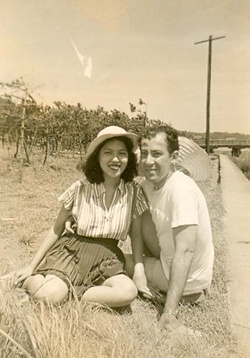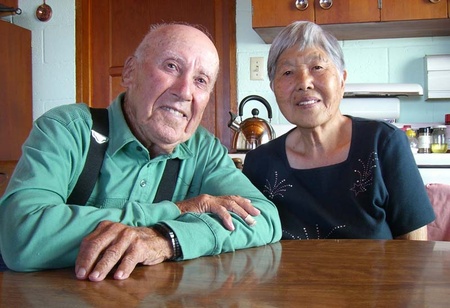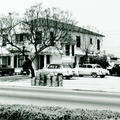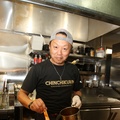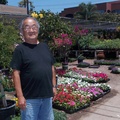Part 1 >>
Please, Come In
Living with her father, however, was seemingly no different than living without him. “Every night, my father would go out to different places. Sometimes it was for business, and sometimes it was to give a speech or lecture. When I saw him once in a while, it was like seeing a stranger.”
Hamako lived with Amano in Kugenuma for 4 years, and her encounter with Harry was completely accidental. One day, on her way home from the optometrist in Kamakura, she was waiting on a platform for her train when somebody started talking to her from behind. It was Harry. Harry had been working in Japan as a member of the US Military Intelligence Service (MIS). Since he was able to speak Japanese, he was itching to speak to somebody. Hamako had graduated from a missionary school, so she knew a little bit of English.
Harry was on his way to Enoshima. After a few words were exchanged, they decided, “We should go together!” and so they did. After having a good time at Enoshima, they promised to meet back at Kamakura station 2 weeks later as they said their goodbyes.
Later on, however, a woman who was helping out at Hamako’s house had invited her to stay at her house. She decided to write a letter to Harry that said, “We should put an end to this,” and “don’t wait for me at the station,” and sent it to the Marunouchi Dai-Ichi Hotel, where Harry had been staying.
After staying at the helper’s home for 2 nights and returning back to her own home, several days later she found that the letter had been returned [unopened]. Questions swirled in her mind as she was overcome with a feeling of guilt: “Why wasn’t it delivered?” “I’ve done such a horrible thing…” She rushed to the Dai-Ichi Hotel with the letter in hand to apologize to Harry in person.
Harry was extremely upset. “I waited all day at Kamakura Station!” he said. But then he followed up by saying, “If you truly feel badly about this… I’m about to head out to see the cherry blossoms that are in full bloom in Ueno. If you come with me, I’ll forgive you.” And so, their relationship began.
Later, Hamako began working at NHK (Nippon Hoso Kyokai / Japan Broadcasting Corporation), where Harry was employed as a language inspector. With the support of their co-worker, a Nikkei Nisei woman named Ms. Naitou, Hamako continued her courtship with Harry. Eventually Harry was discharged and returned to the US, but even after his departure—with help from Ms. Naitou—they exchanged letters for 2 years until Harry returned to Japan again in 1948. He then visited Amano’s home in Kugenuma.
It’s safe to say that Amano’s reaction to meeting Harry for the first time was a perfect reflection of his character. Hamako vividly recalls the incident.
“He happened to be home right then, so I asked him, ‘Father, please meet [Harry].’ But he would just say, ‘No, I won’t meet him.’ ‘But he’s just outside the door,’ I said, but he responded, ‘Why don’t you tell him no yourself?’ I said, ‘I won’t do that,’ and he finally said, ‘Fine, I’ll go tell him myself.’
Amano was already a patriotic person to start with, and on top of that he had the bitter experience of being imprisoned by the American military and returned to Japan by way of repatriation. Surely, he did not have any positive feelings toward Americans.
Hamako waited in her father’s den. She could hear words being exchanged between Amano and Harry at the front door. She felt so afraid, she couldn’t even breathe. But after a short while, she heard her father say, “Please, come in.”
“So after that, it was better.”
So what kind of conversation did Harry have with Amano back then?
“On that day, I said ‘I came here today to ask for your approval to marry your daughter’,” explained Harry, who accompanied Hamako for the interview.
“What? You really said that, right off the bat?” Hamako reacted with genuine surprise; this, after more than 60 years had passed since the incident. Harry had heard a lot about Amano before their first encounter, and had really been afraid of meeting him—“I expected him to be wearing a hakama with a nihontou (Japanese sword) in his hand, ready to kill me,” said Harry. Yet, he proceeded to boldly and firmly say what he needed to say, according to proper Japanese customs. It didn’t take long for Amano to make a judgment on Harry’s character.
“My father had a keen eye for judging people’s character. He could tell if someone was a good person or not from his first impression. He probably saw into the sincerity of my husband’s character.”
Amano learned for the first time that Hamako and Harry had been exchanging letters for the past 2 years. Later that year on December 18th, the two were married. “From then on, my father was most gracious to [Harry]. He provided a place for him to stay, gave him food, and so on…”
So why did Hamako decide to get married to Harry? Of course, it goes without saying that one’s character is an important aspect in deciding on a lifelong partner—but the explanation that Hamako gave was something that stood out to me. Her words revealed characteristics of Amano’s personality as well.
“My father must have thought that I had become like some of the other girls, aimlessly fooling around with foreign men. In fact, after reading The Journal of My Incarceration, I can understand why he was furious when he first met my husband. It had been two years since the war, so the women who had married American soldiers and other foreigners were beginning to have kids; but we rarely heard that these were happy families. Even my co-workers at the news station would ask each other, ‘What do you think about being with a foreigner?’ and suggest in a roundabout way that one should proceed with caution when marrying a foreigner. Given this kind of environment, I thought to myself: ‘Well, then, why don’t I just become the first person happily married to a foreigner?’”
Sixty four years have passed since then. Looking back on her life, Hamako says today, “We didn’t do too well materialistically, but mentally and emotionally it has been very fulfilling over the years.”
© 2012 Yukikazu Nagashima


